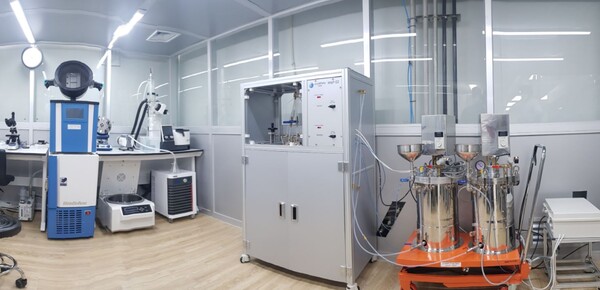[Hans Economy = Reporter Kim Jeong-hwan] NParticle has a platform technology that mass-produces particles of uniform size by applying microfluidic technology. This is an evaluation that overcame the existing particle production limitations.
NParticle succeeded in mass-producing 10kg-class particles per day through the private investment-led technology start-up support project (TIPS program), and has now established a pilot line. This is a particle manufacturing technology that overcomes the limitations of particle production using microfluidic technology with an input flow rate of 5L per minute.
By utilizing the original patented technology of natural materials for particle manufacturing and oral administration protection delivery, we are engaged in the business of manufacturing equipment for gene-bearing lipid nanoparticles (LNP), such as drug delivery (DDS) particle formulations for oral inflammatory bowel disease and mRNA vaccines. . By utilizing microfluidic technology, particles of uniform size are continuously produced and cost and time are drastically reduced.

Photo courtesy: NParticle
Enparticle is also working hard to develop equipment for manufacturing lipid nanoparticles (LNP), which is known as an essential technology for intermittent oral administration of inflammatory bowel disease and mRNA vaccines.
Oral synthetic drugs and injectable biologics are used to treat intractable bowel diseases such as ulcerative colitis and Crohn’s disease. In general, synthetic drugs such as steroids must be taken daily, which causes drug tolerance problems, and weekly injections have problems with safety because they inject the treatment directly into the body.
Considering the problems of these treatments and the convenience of patients, NParticle is developing an oral biologic drug treatment in the form of DDS particles that can be administered intermittently and with sustained release.
In addition, an anti-inflammatory protein treatment that has been proven to improve intestinal leakage has completed a material transfer contract with Oxford University, and is in the process of developing an oral DDS particle formulation.
In particular, in the stomach and small intestine in an acidic environment, the therapeutic agent encapsulated inside the particle is completely protected and delivered to the large intestine. Using this, DDS particles encapsulated with inflammatory bowel disease treatment are being manufactured by applying microfluidic technology.
An official from NParticle said, “We will develop and expand DDS particle formulations encapsulated with various substances by utilizing microfluidic particle manufacturing technology and acid-resistant natural material technology for oral administration in the future.”
The development of vaccine technology has become essential in order to respond quickly to highly mutated viruses such as Corona 19 and to secure national vaccine sovereignty. The government announced a plan to invest 2.2 trillion won by 2026 along with the announcement of the vision and strategy for becoming a K-Global vaccine hub.
EnParticle recently completed the development of microfluidic particle manufacturing lab equipment that reflects user convenience. In addition, it has completed the establishment of a supply chain from design, production, evaluation, and sales for stable equipment commercialization, and plans to launch LNP manufacturing equipment in Korea at the end of December at the earliest.

Photo courtesy: NParticle
Enparticle’s particle mass production technology has scalability that can be applied to various fields such as ink materials for electronic printing, particle materials for precision thermoforming with high fineness, functional cosmetics materials, functional food materials, and medical and filler materials for molding for drug release. It is an excellent platform technology.
In particular, Enparticle’s particle manufacturing technology has the advantage of being universally applicable to various new materials including natural materials such as gelatin, agarose gel, and cellulose. Currently, it is expanding the field to which the business can be applied through collaboration with related companies such as cosmetics, pharmaceuticals, and electronic products.
Source: Hans Economy (http://www.hansbiz.co.kr)


